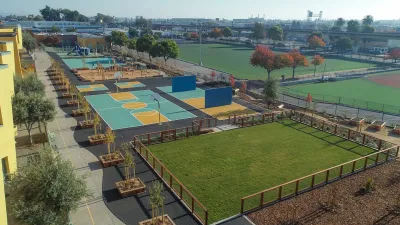Anna Leidreiter explores the ecological principles underlying Oakland's dramatically successful waste reduction program, and echoes the refrain that modern cities must think about consumption and waste in cyclical terms.
Central to any truly meaningful, sustainable urban sanitation program is an intimate understanding of ecosystems. To the natural world, there is no such thing as waste; as Leidreiter explains, "all wastes produced are converted into nutrients for future growth." And while clean energy often takes center stage in discussions of sustainability, finding ways to integrate ecological cycles into urban waste policy is just as critical.
To make that shift on an urban scale requires a holistic approach: just as those managing waste must consider its origin, those creating raw materials and refined products must consider their ultimate destination. These principles laid the foundation of the City of Oakland's waste reduction program, which began in 2006 with the adoption of a simple goal: zero waste by 2020.
In the first four years of the program, Oakland cut its annual landfill input by almost 30 percent – from 400,000 tons per year down to 291,000. The introduction of a composting program for organic material (food scraps and yard waste) alone led much of the progress: in 2008, organic material accounted for 48 percent of all garbage destined for Oakland's landfills.
Leidreiter notes that the program moves forward in "logical increments": "(1) improving downstream reuse and recycling of end-of-life products and materials, (2) pursuing upstream re-design strategies to reduce the volume and toxicity of discarded products and materials and promote low-impact lifestyles, and (3) fostering and supporting the use of discarded products and materials to stimulate and drive local economic and workforce development."
FULL STORY: Circular metabolism: turning regenerative cities into reality

Maui's Vacation Rental Debate Turns Ugly
Verbal attacks, misinformation campaigns and fistfights plague a high-stakes debate to convert thousands of vacation rentals into long-term housing.

Planetizen Federal Action Tracker
A weekly monitor of how Trump’s orders and actions are impacting planners and planning in America.

In Urban Planning, AI Prompting Could be the New Design Thinking
Creativity has long been key to great urban design. What if we see AI as our new creative partner?

King County Supportive Housing Program Offers Hope for Unhoused Residents
The county is taking a ‘Housing First’ approach that prioritizes getting people into housing, then offering wraparound supportive services.

Researchers Use AI to Get Clearer Picture of US Housing
Analysts are using artificial intelligence to supercharge their research by allowing them to comb through data faster. Though these AI tools can be error prone, they save time and housing researchers are optimistic about the future.

Making Shared Micromobility More Inclusive
Cities and shared mobility system operators can do more to include people with disabilities in planning and operations, per a new report.
Urban Design for Planners 1: Software Tools
This six-course series explores essential urban design concepts using open source software and equips planners with the tools they need to participate fully in the urban design process.
Planning for Universal Design
Learn the tools for implementing Universal Design in planning regulations.
planning NEXT
Appalachian Highlands Housing Partners
Mpact (founded as Rail~Volution)
City of Camden Redevelopment Agency
City of Astoria
City of Portland
City of Laramie





























